JSON to python object
The follwing code creates dynamic attributes with the objects keys recursively.
JSON object - fb_data.json:
{
"name": "John Smith",
"hometown": {
"name": "New York",
"id": 123
},
"list": [
"a",
"b",
"c",
1,
{
"key": 1
}
],
"object": {
"key": {
"key": 1
}
}
}
On the conversion we have 3 cases:
- lists
- dicts (new object)
- bool, int, float and str
import json
class AppConfiguration(object):
def __init__(self, data=None):
if data is None:
with open("fb_data.json") as fh:
data = json.loads(fh.read())
else:
data = dict(data)
for key, val in data.items():
setattr(self, key, self.compute_attr_value(val))
def compute_attr_value(self, value):
if isinstance(value, list):
return [self.compute_attr_value(x) for x in value]
elif isinstance(value, dict):
return AppConfiguration(value)
else:
return value
if __name__ == "__main__":
instance = AppConfiguration()
print(instance.name)
print(instance.hometown.name)
print(instance.hometown.id)
print(instance.list[4].key)
print(instance.object.key.key)
Now the key, value pairs are attributes - objects.
output:
John Smith
New York
123
1
1
Paste JSON as Code
Supports TypeScript, Python, Go, Ruby, C#, Java, Swift, Rust, Kotlin, C++, Flow, Objective-C, JavaScript, Elm, and JSON Schema.
- Interactively generate types and (de-)serialization code from JSON, JSON Schema, and TypeScript
- Paste JSON/JSON Schema/TypeScript as code

quicktype infers types from sample JSON data, then outputs strongly typed models and serializers for working with that data in your desired programming language.
output:
# Generated by https://quicktype.io
#
# To change quicktype's target language, run command:
#
# "Set quicktype target language"
from typing import List, Union
class Hometown:
name: str
id: int
def __init__(self, name: str, id: int) -> None:
self.name = name
self.id = id
class Key:
key: int
def __init__(self, key: int) -> None:
self.key = key
class Object:
key: Key
def __init__(self, key: Key) -> None:
self.key = key
class FbData:
name: str
hometown: Hometown
list: List[Union[Key, int, str]]
object: Object
def __init__(self, name: str, hometown: Hometown, list: List[Union[Key, int, str]], object: Object) -> None:
self.name = name
self.hometown = hometown
self.list = list
self.object = object
This extension is available for free in the Visual Studio Code Marketplace.
